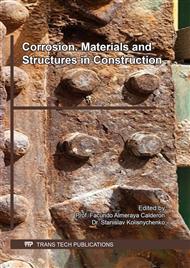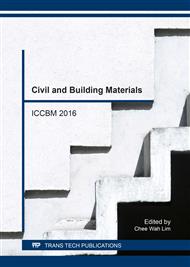p.14
p.20
p.26
p.33
p.41
p.47
p.55
p.60
p.65
The Impact of Electrochemical Chloride Extraction on Reinforced Bond
Abstract:
This paper examines the impact of type of electrolyte solutions, standing time without electricity on the reinforced bond of the concrete of different water cement ratio before and after chloride extraction, processes the microscopic structure and mechanism analysis. The electrochemistry method can discharge the chlorine salt without destroying the original concrete protective layer and realize the non-loss, low cost and fast repair for the concrete structure destroyed by the chlorine salt corrosion. The results show a substantial loss of the reinforced bond (70-76%) after chloride extraction according to the concrete of different water cement ratio, and the decrease is in proportion to the current-on time and the electrochemical capacity of the electrolyte. The increased partial porosity of the cathode area of the concrete by the chlorine and hydrogen produced in the process of electrochemical chlorine extraction, the decomposition and softening of the concrete hydration products with external field are the main reasons for the dramatic drop of the reinforce bond.
Info:
Periodical:
Pages:
41-46
DOI:
Citation:
Online since:
July 2017
Authors:
Keywords:
Price:
Сopyright:
© 2017 Trans Tech Publications Ltd. All Rights Reserved
Share:
Citation:



